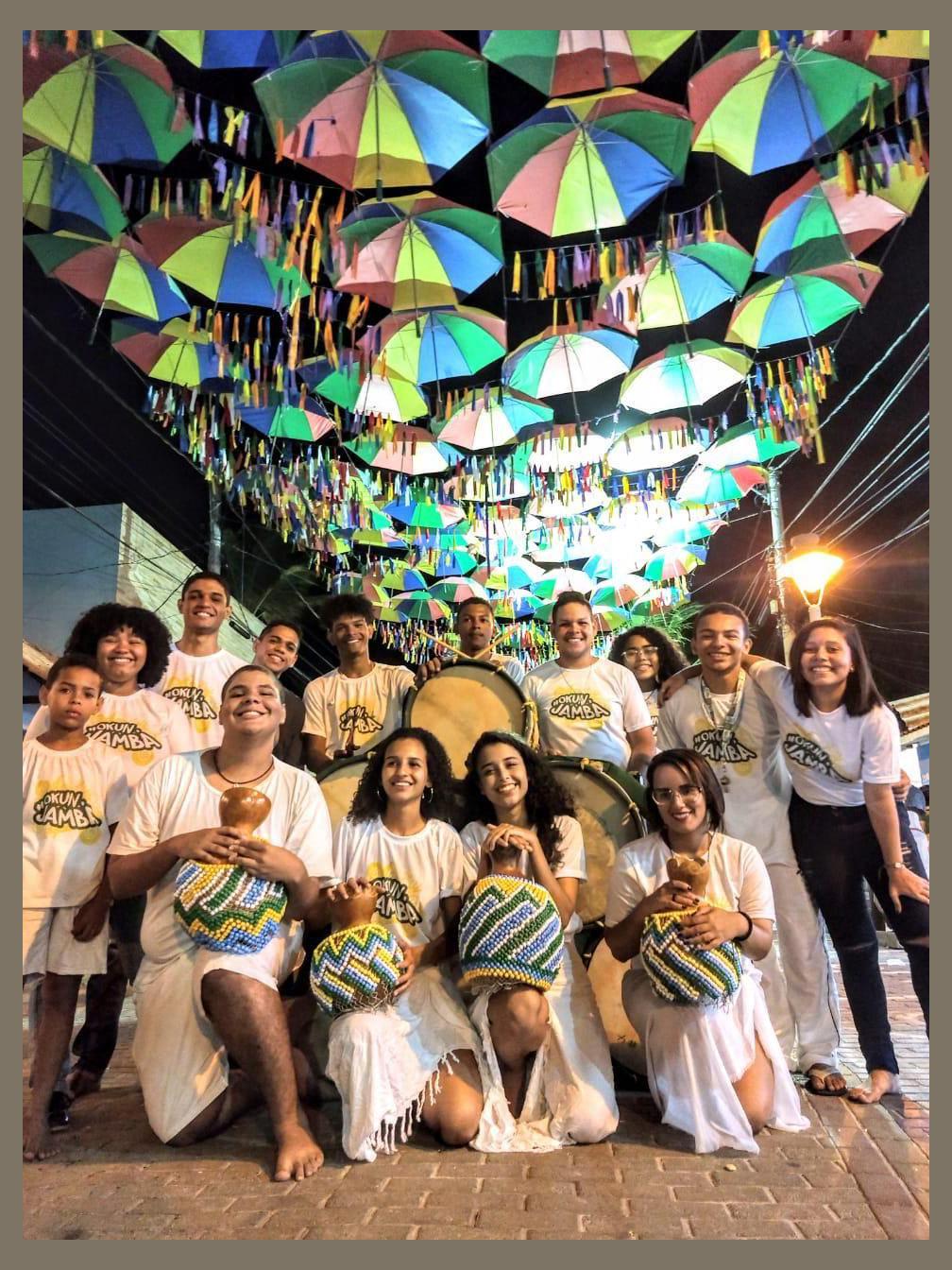 Okun Jambá
Okun Jambá
Okun Jambá: The Rhythms of Exu and the Journey of a Musical Collective
In the vibrant tapestry of Afro-Brazilian music, Okun Jambá stands as a beacon of spiritual power and artistic innovation. The collective's captivating melodies and infectious rhythms have captivated audiences worldwide, earning them a reputation as one of the most influential exponents of candomblé music in contemporary times.
Genesis and Early Years
Okun Jambá emerged in the heart of Salvador, Bahia, in 1993. The collective was founded by a group of musicians and dancers who shared a deep passion for candomblé, an Afro-Brazilian religion that celebrates the orixás, divine spirits that govern the natural world and human destiny.
Inspired by the ritual practices and rhythms of candomblé, Okun Jambá sought to create music that transcended traditional boundaries. Their compositions fused the sacred chants and percussive grooves of candomblé with contemporary musical influences, resulting in a unique and captivating sound that resonated with both traditionalists and modern listeners alike.
Rise to Prominence
Okun Jambá's debut album, "Sete Vezes (Ponto de Exu)," released in 1996, catapulted the collective to national fame. The album's title track, an ode to the orixá Exu, became an instant anthem, resonating with listeners across Brazil and beyond. The album's success paved the way for numerous collaborations with renowned artists, including Caetano Veloso, Marisa Monte, and Gilberto Gil.
Challenges and Controversies
Despite their critical and commercial acclaim, Okun Jambá's journey was not without its challenges. The collective's outspoken lyrics and unconventional musical style drew criticism from some conservative religious leaders who questioned the appropriateness of using sacred music for secular purposes.
Undeterred by the controversy, Okun Jambá remained steadfast in their mission to spread the message of candomblé and its cultural significance. They continued to perform and record music that celebrated the orixás and promoted religious tolerance.
Discography
Over the course of their illustrious career, Okun Jambá has released a rich discography that showcases the collective's musical evolution and commitment to candomblé traditions. Notable albums include:
* Sete Vezes (Ponto de Exu) (1996)
* Filhos de Gandhy (2000)
* Caminhos (2004)
* No Ponto (2008)
* Oração do Tempo (2014)
Members
Throughout its history, Okun Jambá has been graced by a roster of talented musicians and dancers. Key members include:
* Gilvan Oliveira (vocals, percussion)
* Valdenor da Costa (percussion)
* Emerson Taquari (bass)
* Adriana Calcanhotto (vocals, guitar)
* Mestre Jackson do Pandeiro (percussion)
Legacy and Influence
Okun Jambá's music has had a profound impact on the global music scene. Their innovative approach to candomblé music has inspired countless artists and paved the way for a new generation of musicians to explore the sacred and spiritual dimensions of their cultural heritage.
Today, Okun Jambá continues to perform and record, carrying the torch of candomblé music into the future. Their enduring legacy lies in their ability to bridge the sacred and the secular, promoting religious tolerance and fostering a deeper understanding of the rich cultural tapestry of Brazil.
In the vibrant tapestry of Afro-Brazilian music, Okun Jambá stands as a beacon of spiritual power and artistic innovation. The collective's captivating melodies and infectious rhythms have captivated audiences worldwide, earning them a reputation as one of the most influential exponents of candomblé music in contemporary times.
Genesis and Early Years
Okun Jambá emerged in the heart of Salvador, Bahia, in 1993. The collective was founded by a group of musicians and dancers who shared a deep passion for candomblé, an Afro-Brazilian religion that celebrates the orixás, divine spirits that govern the natural world and human destiny.
Inspired by the ritual practices and rhythms of candomblé, Okun Jambá sought to create music that transcended traditional boundaries. Their compositions fused the sacred chants and percussive grooves of candomblé with contemporary musical influences, resulting in a unique and captivating sound that resonated with both traditionalists and modern listeners alike.
Rise to Prominence
Okun Jambá's debut album, "Sete Vezes (Ponto de Exu)," released in 1996, catapulted the collective to national fame. The album's title track, an ode to the orixá Exu, became an instant anthem, resonating with listeners across Brazil and beyond. The album's success paved the way for numerous collaborations with renowned artists, including Caetano Veloso, Marisa Monte, and Gilberto Gil.
Challenges and Controversies
Despite their critical and commercial acclaim, Okun Jambá's journey was not without its challenges. The collective's outspoken lyrics and unconventional musical style drew criticism from some conservative religious leaders who questioned the appropriateness of using sacred music for secular purposes.
Undeterred by the controversy, Okun Jambá remained steadfast in their mission to spread the message of candomblé and its cultural significance. They continued to perform and record music that celebrated the orixás and promoted religious tolerance.
Discography
Over the course of their illustrious career, Okun Jambá has released a rich discography that showcases the collective's musical evolution and commitment to candomblé traditions. Notable albums include:
* Sete Vezes (Ponto de Exu) (1996)
* Filhos de Gandhy (2000)
* Caminhos (2004)
* No Ponto (2008)
* Oração do Tempo (2014)
Members
Throughout its history, Okun Jambá has been graced by a roster of talented musicians and dancers. Key members include:
* Gilvan Oliveira (vocals, percussion)
* Valdenor da Costa (percussion)
* Emerson Taquari (bass)
* Adriana Calcanhotto (vocals, guitar)
* Mestre Jackson do Pandeiro (percussion)
Legacy and Influence
Okun Jambá's music has had a profound impact on the global music scene. Their innovative approach to candomblé music has inspired countless artists and paved the way for a new generation of musicians to explore the sacred and spiritual dimensions of their cultural heritage.
Today, Okun Jambá continues to perform and record, carrying the torch of candomblé music into the future. Their enduring legacy lies in their ability to bridge the sacred and the secular, promoting religious tolerance and fostering a deeper understanding of the rich cultural tapestry of Brazil.